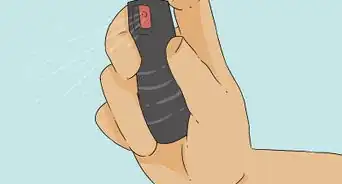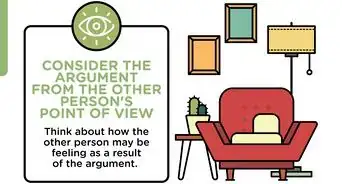This article was co-authored by Sabrina Grover, LMSW. Sabrina Grover, LMSW is a Licensed Master Social Worker (LMSW) who earned her degree in Advanced Clinical Practice from New York University. Sabrina has experience working in substance abuse recovery centers and schools where she gained experience providing evidence-based treatment to children, adolescents, adults, and families. Sabrina specializes in Dialectical, Narrative, and Cognitive Behavioral Therapies. She has particular expertise in treating clients struggling with grief, complex trauma, interpersonal difficulty, family conflict, anxiety, and depression. She commits to providing a supportive environment for everyone who commits to growth and offering a warm, non-judgmental atmosphere.
This article has been viewed 84,528 times.
Are you tired of getting dragged into arguments and never knowing how to get out? Use a simple technique called "being the bigger person." When you become the "bigger" person, the arguments stop. We've covered everything you need to know about being the bigger person, so you can put your best foot forward in your next tough conversation or interaction.
Steps
Expert Q&A
-
QuestionHow do I cope with someone who's determined to be my enemy? Should I try to be as nice as I can?
 Sabrina Grover, LMSWSabrina Grover, LMSW is a Licensed Master Social Worker (LMSW) who earned her degree in Advanced Clinical Practice from New York University. Sabrina has experience working in substance abuse recovery centers and schools where she gained experience providing evidence-based treatment to children, adolescents, adults, and families. Sabrina specializes in Dialectical, Narrative, and Cognitive Behavioral Therapies. She has particular expertise in treating clients struggling with grief, complex trauma, interpersonal difficulty, family conflict, anxiety, and depression. She commits to providing a supportive environment for everyone who commits to growth and offering a warm, non-judgmental atmosphere.
Sabrina Grover, LMSWSabrina Grover, LMSW is a Licensed Master Social Worker (LMSW) who earned her degree in Advanced Clinical Practice from New York University. Sabrina has experience working in substance abuse recovery centers and schools where she gained experience providing evidence-based treatment to children, adolescents, adults, and families. Sabrina specializes in Dialectical, Narrative, and Cognitive Behavioral Therapies. She has particular expertise in treating clients struggling with grief, complex trauma, interpersonal difficulty, family conflict, anxiety, and depression. She commits to providing a supportive environment for everyone who commits to growth and offering a warm, non-judgmental atmosphere.
Licensed Master Social Worker Absolutely—empathy is always key. You're more likely to build rapport if you try to understand someone's perspective, even (or especially) if they give you a hard time. Realize that everyone struggles, and this person's negative attitude might be the result of an internal battle. While this individual is ultimately responsible for their actions and how they carry themselves, you can make the world a little nicer by not reacting to them. Instead, focus on being your best and kindest self. This individual might even warm up to you. Even if they don't, you'll be so focused on being a good person that you'll hardly think about this so-called enemy.
Absolutely—empathy is always key. You're more likely to build rapport if you try to understand someone's perspective, even (or especially) if they give you a hard time. Realize that everyone struggles, and this person's negative attitude might be the result of an internal battle. While this individual is ultimately responsible for their actions and how they carry themselves, you can make the world a little nicer by not reacting to them. Instead, focus on being your best and kindest self. This individual might even warm up to you. Even if they don't, you'll be so focused on being a good person that you'll hardly think about this so-called enemy. -
QuestionHow can I bear my defeat?
 Community AnswerTake a deep breath, think of a time when you worked had and did well. Remind yourself that defeat is normal. List people or situations that you have heard about that have failed at something and it led to better things. For example, Michael Jordan the great basketball player, was cut from his high school basketball team and used this defeat to become one of the greatest basketball players in NBA history!
Community AnswerTake a deep breath, think of a time when you worked had and did well. Remind yourself that defeat is normal. List people or situations that you have heard about that have failed at something and it led to better things. For example, Michael Jordan the great basketball player, was cut from his high school basketball team and used this defeat to become one of the greatest basketball players in NBA history! -
QuestionHow do I react when the other person is being immature in an argument and making me want to defend myself (for example, not stopping when asked to and using insults)?
 Community AnswerTo be the bigger person in the argument, don't respond back with insulting words. Say what you need to in a polite way. If you need help, or if the person is being too immature/rude with their words, be sure to tell a trusted adult.
Community AnswerTo be the bigger person in the argument, don't respond back with insulting words. Say what you need to in a polite way. If you need help, or if the person is being too immature/rude with their words, be sure to tell a trusted adult.
Warnings
- Your efforts may make the situation worse because the person might dislike you even more because of your strength. If so, apologize (no matter how much you don't want to) and start from a clean slate.⧼thumbs_response⧽
References
- ↑ https://kidshelpphone.ca/get-info/arguing-friend-heres-how-fight-fair
- ↑ https://www.apa.org/topics/anger/control
- ↑ https://www.theguardian.com/lifeandstyle/2020/jan/03/how-to-stop-having-the-same-argument-again-and-again-and-again
- ↑ https://psychcentral.com/blog/6-tips-for-de-escalating-an-argument#1

































































